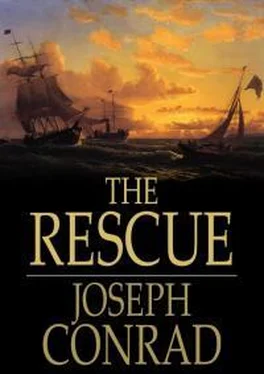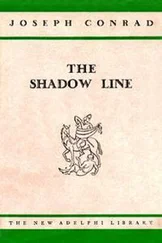"Here he is. Came in last night," whispered the gossiping group.
Lingard did not see the covert glances of respect tempered by irony; he nodded and passed on.
"Hey, Tom! No time for a drink?" would shout someone.
He would shake his head without looking back—far away already.
Florid and burly he could be seen, for a day or two, getting out of dusty gharries, striding in sunshine from the Occidental Bank to the Harbour Office, crossing the Esplanade, disappearing down a street of Chinese shops, while at his elbow and as tall as himself, old Jorgenson paced along, lean and faded, obstinate and disregarded, like a haunting spirit from the past eager to step back into the life of men.
Lingard ignored this wreck of an adventurer, sticking to him closer than his shadow, and the other did not try to attract attention. He waited patiently at the doors of offices, would vanish at tiffin time, would invariably turn up again in the evening and then he kept his place till Lingard went aboard for the night. The police peons on duty looked disdainfully at the phantom of Captain H. C. Jorgenson, Barque Wild Rose, wandering on the silent quay or standing still for hours at the edge of the sombre roadstead speckled by the anchor lights of ships—an adventurous soul longing to recross the waters of oblivion.
The sampan-men, sculling lazily homeward past the black hull of the brig at anchor, could hear far into the night the drawl of the New England voice escaping through the lifted panes of the cabin skylight. Snatches of nasal sentences floated in the stillness around the still craft.
"Yes, siree! Mexican war rifles—good as new—six in a case—my people in Baltimore—that's so. Hundred and twenty rounds thrown in for each specimen—marked to suit your requirements. Suppose—musical instruments, this side up with care—how's that for your taste? No, no! Cash down—my people in Balt—Shooting sea-gulls you say? Waal! It's a risky business—see here—ten per cent. discount—it's out of my own pocket—"
As time wore on, and nothing happened, at least nothing that one could hear of, the excitement died out. Lingard's new attitude was accepted as only "his way." There was nothing in it, maintained some. Others dissented. A good deal of curiosity, however, remained and the faint rumour of something big being in preparation followed him into every harbour he went to, from Rangoon to Hongkong.
He felt nowhere so much at home as when his brig was anchored on the inner side of the great stretch of shoals. The centre of his life had shifted about four hundred miles—from the Straits of Malacca to the Shore of Refuge—and when there he felt himself within the circle of another existence, governed by his impulse, nearer his desire. Hassim and Immada would come down to the coast and wait for him on the islet. He always left them with regret.
At the end of the first stage in each trip, Jorgenson waited for him at the top of the boat-stairs and without a word fell into step at his elbow. They seldom exchanged three words in a day; but one evening about six months before Lingard's last trip, as they were crossing the short bridge over the canal where native craft lie moored in clusters, Jorgenson lengthened his stride and came abreast. It was a moonlight night and nothing stirred on earth but the shadows of high clouds. Lingard took off his hat and drew in a long sigh in the tepid breeze. Jorgenson spoke suddenly in a cautious tone: "The new Rajah Tulla smokes opium and is sometimes dangerous to speak to. There is a lot of discontent in Wajo amongst the big people."
"Good! Good!" whispered Lingard, excitedly, off his guard for once. Then—"How the devil do you know anything about it?" he asked.
Jorgenson pointed at the mass of praus, coasting boats, and sampans that, jammed up together in the canal, lay covered with mats and flooded by the cold moonlight with here and there a dim lantern burning amongst the confusion of high sterns, spars, masts and lowered sails.
"There!" he said, as they moved on, and their hatted and clothed shadows fell heavily on the queer-shaped vessels that carry the fortunes of brown men upon a shallow sea. "There! I can sit with them, I can talk to them, I can come and go as I like. They know me now—it's time-thirty-five years. Some of them give a plate of rice and a bit of fish to the white man. That's all I get—after thirty-five years—given up to them."
He was silent for a time.
"I was like you once," he added, and then laying his hand on Lingard's sleeve, murmured—"Are you very deep in this thing?"
"To the very last cent," said Lingard, quietly, and looking straight before him.
The glitter of the roadstead went out, and the masts of anchored ships vanished in the invading shadow of a cloud.
"Drop it," whispered Jorgenson.
"I am in debt," said Lingard, slowly, and stood still.
"Drop it!"
"Never dropped anything in my life."
"Drop it!"
"By God, I won't!" cried Lingard, stamping his foot.
There was a pause.
"I was like you—once," repeated Jorgenson. "Five and thirty years—never dropped anything. And what you can do is only child's play to some jobs I have had on my hands—understand that—great man as you are, Captain Lingard of the Lightning. . . . You should have seen the Wild Rose," he added with a sudden break in his voice.
Lingard leaned over the guard-rail of the pier. Jorgenson came closer.
"I set fire to her with my own hands!" he said in a vibrating tone and very low, as if making a monstrous confession.
"Poor devil," muttered Lingard, profoundly moved by the tragic enormity of the act. "I suppose there was no way out?"
"I wasn't going to let her rot to pieces in some Dutch port," said Jorgenson, gloomily. "Did you ever hear of Dawson?"
"Something—I don't remember now—" muttered Lingard, who felt a chill down his back at the idea of his own vessel decaying slowly in some Dutch port. "He died—didn't he?" he asked, absently, while he wondered whether he would have the pluck to set fire to the brig—on an emergency.
"Cut his throat on the beach below Fort Rotterdam," said Jorgenson. His gaunt figure wavered in the unsteady moonshine as though made of mist. "Yes. He broke some trade regulation or other and talked big about law-courts and legal trials to the lieutenant of the Komet. 'Certainly,' says the hound. 'Jurisdiction of Macassar, I will take your schooner there.' Then coming into the roads he tows her full tilt on a ledge of rocks on the north side—smash! When she was half full of water he takes his hat off to Dawson. 'There's the shore,' says he—'go and get your legal trial, you—Englishman—'" He lifted a long arm and shook his fist at the moon which dodged suddenly behind a cloud. "All was lost. Poor Dawson walked the streets for months barefooted and in rags. Then one day he begged a knife from some charitable soul, went down to take a last look at the wreck, and—"
"I don't interfere with the Dutch," interrupted Lingard, impatiently. "I want Hassim to get back his own—"
"And suppose the Dutch want the things just so," returned Jorgenson. "Anyway there is a devil in such work—drop it!"
"Look here," said Lingard, "I took these people off when they were in their last ditch. That means something. I ought not to have meddled and it would have been all over in a few hours. I must have meant something when I interfered, whether I knew it or not. I meant it then—and did not know it. Very well. I mean it now—and do know it. When you save people from death you take a share in their life. That's how I look at it."
Jorgenson shook his head.
"Foolishness!" he cried, then asked softly in a voice that trembled with curiosity—"Where did you leave them?"
"With Belarab," breathed out Lingard. "You knew him in the old days."
Читать дальше












